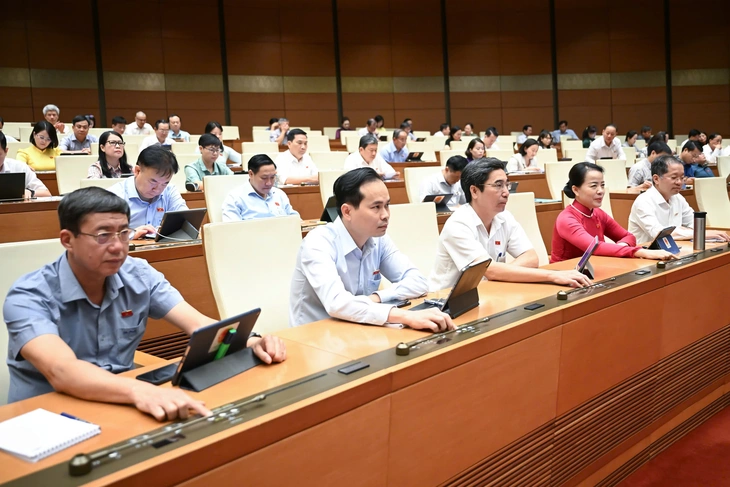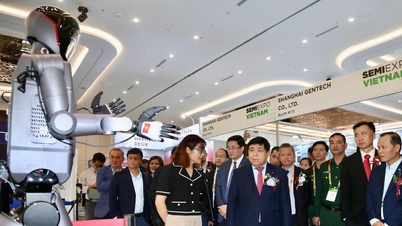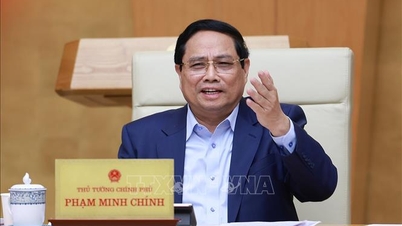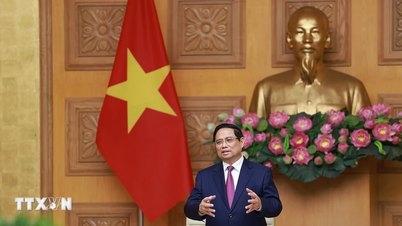
Delegates press the button to pass the Law on Enterprises (amended) - Photo: National Assembly
Accordingly, the law passed and effective on July 1 has defined the concept of beneficial owner of an enterprise, and assigned the Government to provide specific guidance on criteria for determining and sanctions for violations when information is not provided.
Disclosure of beneficial ownership information to business authorities
Accordingly, the beneficial owner of a legal entity enterprise is an individual who has actual ownership of the charter capital or has the right to control that enterprise, except for the case of the direct owner representative at an enterprise in which the State holds 100% of the charter capital and the representative of the State capital invested in a joint stock company or a limited liability company with two or more members according to the provisions of law on management and investment of State capital in enterprises.
However, the law does not specify a specific time limit for enterprises established before the effective date of this law to provide information on beneficial owners to the business registration authority.
Previously, during the discussion, some opinions suggested adding a transitional provision, stipulating a specific time limit for enterprises established before the effective date of this law to supplement information about the beneficial owners of the enterprise.
Explaining the acceptance before the law was passed, Minister of Finance Nguyen Van Thang said that the Government would amend it in the direction of adding information about beneficial owners to be carried out simultaneously at the time the enterprise carries out procedures to register changes to the enterprise registration content.
Enterprises established before the law takes effect do not have to provide information on beneficial owners because requiring enterprises to carry out a separate administrative procedure just to declare additional information on beneficial owners will increase the number of procedures and incur compliance costs for enterprises.
“This is not suitable in the context that the Party and State are implementing many drastic policies and strategies to simplify and reduce the time and cost of carrying out procedures. This requirement is also not suitable with the principle of non-retroactivity” - Mr. Thang said that this is not an optimal solution in the context that information collection and provision can be done when requested by competent state agencies.
At the same time, the number of enterprises providing information about beneficial owners to the business registration agency is increasingly complete over time (on average, about 35% of enterprises register to change the content of business registration every year), so this information will be updated.
Tighten non-public enterprises to issue private bonds
Regarding the issuance of private bonds by non-public companies, National Assembly deputies proposed not to stipulate specific conditions for enterprises, but to consider regulations similar to the Securities Law in the direction of assigning regulations to the Government.
However, maintaining the view that it is necessary to regulate this content, the Minister of Finance said that the National Assembly Standing Committee also agreed to add regulations on the debt-to-equity ratio as one of the conditions for issuing private bonds of non-public companies.
Therefore, the law passed allows joint stock companies that are not public companies to offer private bonds, while satisfying the conditions prescribed in the 2000 Enterprise Law and ensuring specific additional criteria.
Regarding the previous proposal on adding the category of civil servants who are allowed to participate in establishing and managing enterprises, Mr. Thang said that based on the opinions received, the law was passed stipulating that the category of civil servants who are not allowed to establish, contribute capital to and manage enterprises includes civil servants and public employees according to the provisions of the Law on Cadres, Civil Servants and the Law on Public Employees.
However, this provision is applicable except in the fields of science, technology, innovation and national digital transformation as prescribed by the Law on Science, Technology and Innovation, relevant resolutions and regulations.
Source: https://tuoitre.vn/doanh-nghiep-thanh-lap-tu-1-7-phai-cong-bo-thong-tin-chu-so-huu-huong-loi-20250617093630441.htm










































![[Photo] Da Nang: Hundreds of people join hands to clean up a vital tourist route after storm No. 13](https://vphoto.vietnam.vn/thumb/1200x675/vietnam/resource/IMAGE/2025/11/07/1762491638903_image-3-1353-jpg.webp)








































































Comment (0)